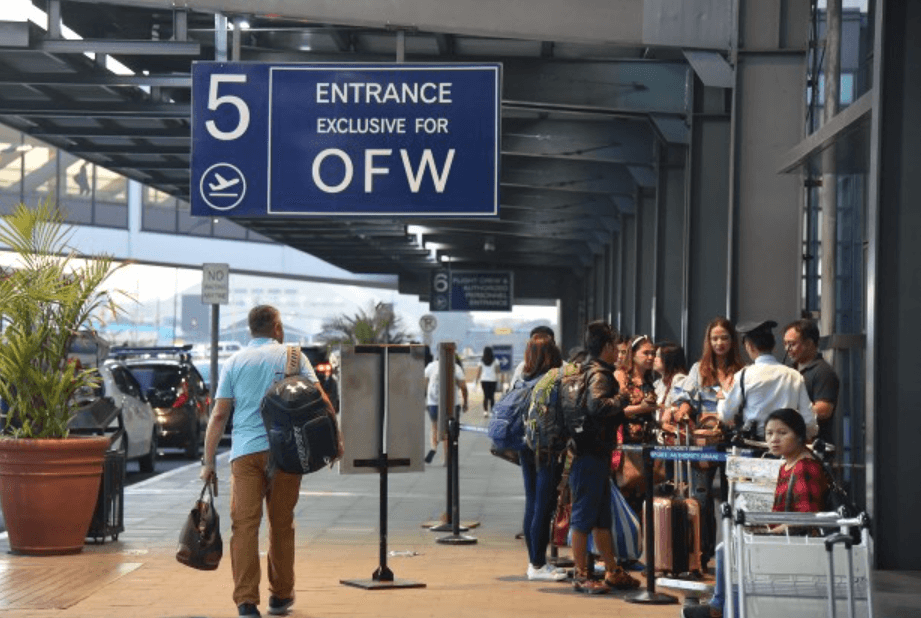Why Do Filipinos Choose to Work Abroad?
Key takeaways:
- Economic motivations, like higher salaries abroad, drive many Filipinos to work overseas
- Pros of working abroad include higher salaries, exposure to new cultures, and government benefits
- Cons include detachment from family, potential exploitation, and legal risks in host countries

Filipinos are known for their resilience, hard work, and hospitality. They are also one of the largest groups of migrant workers in the world, as the total number of overseas Filipino workers (OFW) is expected to reach 2 million in 2023 (1), up from 1.2 million in 2022.
But what drives them to leave their homeland and seek opportunities elsewhere? Here are the main reasons why Filipinos work abroad.
- Apply with only one Valid ID
- Apply now and get approved in minutes

4 Reasons Why Filipino Work Abroad
While the promise of a better economic future is a significant draw, it’s just one facet of the multifaceted reasons that propel these individuals to venture overseas. From the pursuit of personal growth to the deep-rooted familial ties, let’s delve into the various motivations, encompassing both economic and non-economic facets, that inspire OFWs to work abroad.
1. Economic Motivations
One of the most obvious and compelling reasons why Filipino choose to work abroad is to improve their economic situation. Many Filipinos face challenges such as low wages, poor economic conditions, and high unemployment rates in their own country.
🔎 Higher Salary and Better Benefits
The salary structure in the Philippines is one of the lowest in the region, with the minimum wage being around 12,239.5 Philippine Pesos (3) per month, depending on the location. Many Filipinos cannot make ends meet with their regular jobs, especially if they have to support a large family.
Working abroad offers them a chance to earn more money and enjoy better benefits. For example, a Filipino nurse can earn around $7,500 per month in the United States, compared to only $1,400 per month in the Philippines. Some benefits that OFWs enjoy abroad include health insurance, pensions, and tax incentives.
🔎 Poor Economic Conditions
Many Filipinos are dissatisfied with the economic situation in the Philippines, such as the low growth rate, high inflation rate, and a weak currency.
Working abroad allows OFWs to cope with the poor economic conditions by sending remittances, investing in businesses, or supporting social causes. For example, personal remittances for the first five months of 2023 grew by 3.1 percent (1) to US$14.46 billion from US$14.02 billion posted in the comparable period in 2022.
Remittances help boost consumption, reduce poverty, and increase savings in the Philippines.
🔎 High Unemployment Rates
There is an alarming trend of high unemployment in the Philippines, especially among the youth and the educated. The COVID-19 pandemic has worsened the situation, causing many businesses to close and workers to lose their jobs.
OFW reasons for working abroad include more opportunities for employment, career prospects, professional development, and skills enhancement.
🔎 Strict Qualifications for Certain Roles
In the Philippines, many prestigious and well-established companies set high standards for potential employees. They frequently look for candidates with an impressive array of qualifications, including advanced education, extensive work experience, and specific skill sets.
It’s not uncommon for these companies to require a college degree and several years of relevant experience as baseline criteria for consideration. This stringent selection process can pose challenges for those who might not have had the opportunity to pursue higher education or accumulate years of experience in their field. As a result, many talented individuals may find themselves in roles that don’t fully leverage their potential or provide competitive compensation.

2. Personal Growth Opportunities
Another reason why Filipinos work abroad is to pursue personal growth opportunities. Many Filipinos aspire to pursue higher education abroad, explore different cultures and lifestyles abroad, or own a house or property abroad.
✅ Education Opportunities
Many Filipinos want to pursue higher education abroad, either for themselves or for their children. Studying abroad can open up more doors for Filipinos, such as gaining international exposure, learning new languages, and accessing quality education.
However, pursuing education abroad also poses challenges for OFWs, such as financial constraints, visa requirements, and academic adjustments.
✅ Job Variety
Many Filipinos are adventurous and curious to explore different cultures and lifestyles abroad. Working abroad offers them a chance to experience job variety, such as working in various industries, sectors, and cultures.
Working abroad also rewards OFWs with personal growth, cultural diversity, and global awareness.
✅ Opportunity to Renew Contracts
Working abroad often presents a contractual employment model. While many might view permanent positions as the ideal, there’s an inherent flexibility and potential in contractual roles for expatriates. The beauty of these contracts lies in their renewability.
Once a contract concludes, there’s typically an option to renew, allowing continuity in employment without the hassle of starting afresh. This renewal process not only provides job security but also offers a chance to renegotiate terms based on performance and market conditions.
✅ Real Estate Investments
Many Filipinos dream of owning a house or property in the Philippines or abroad. Working abroad enables them to save up for their real estate investments, such as buying land, building houses, or renting apartments.
Working abroad also benefits OFWs with a more reliable source of income, security for their future, and a place to return to.
3. Residence Permit for Overseas Filipino Workers
For many Overseas Filipino Workers (OFWs), the prospect of working abroad is not just about economic upliftment or personal growth. One of the often-underestimated motivations is the potential to secure a residence permit in their host country. This permit, often seen as a golden ticket, offers a myriad of opportunities and benefits that go beyond the immediate job at hand.
A residence permit means that the OFW has the right to live, work, and, in many cases, enjoy the same benefits as the citizens of that country. It’s a step closer to permanent residency, and for some, even citizenship. This not only provides a sense of security but also opens doors to better job opportunities and access to education, healthcare, and other social services.
Moreover, having a residence permit can be a game-changer for the families of OFWs. It often comes with the possibility of family reunification, allowing OFWs to bring their loved ones to live with them.
However, it often requires fulfilling specific criteria, from the duration of stay to demonstrating financial stability and even language proficiency in some countries. But for many OFWs, these hurdles are worth the effort, given the long-term benefits and the promise of a brighter future for themselves and their families that can transform the trajectory of their lives and the generations that follow.
Learn all about
OFW Loan Online in the Philippines: Requirements, Terms and Conditions
4. Family & Social Factors
The last reason why many Filipino choose to work abroad is related to family and social factors. Filipinos are family-centric and put their family at the center of their lives, especially their children and parents. Working abroad allows them to support their family members, bring their families abroad, or reunite with their loved ones.
👉 Supporting Family Members
One of the main motivations why OFW work abroad is to support their family members in the Philippines, especially their children and parents. Working abroad enables them to send remittances to their families to pay for their education, health care, and daily expenses.
Remittances help improve the living standards, human capital, and social welfare of OFW families.
👉 Opportunity to Bring Their Families Abroad
Another motivation for OFWs is to bring their families abroad to enjoy a better quality of life and escape the hardships in the Philippines. Working abroad allows them to apply for a family visa, sponsor their relatives, or join a family volunteer program.
Working abroad also enables OFWs and their families to access welfare services, education opportunities, cultural diversity, and personal growth.
👉 Reuniting with Loved Ones
The final motivation for OFWs is to reunite with their loved ones already working or living abroad.
Working abroad allows them to join their spouses, partners, children, parents, or siblings who have migrated or settled abroad.

Why do Filipinos Work Abroad | Pros & Cons
| Pros | Cons |
|---|---|
| Higher Salary: Overseas Filipino Workers (OFWs) typically earn at least twice what’s considered a decent wage in the Philippines for the same amount of work. | Detachment from Family: Working abroad often means being away from family for extended periods. |
| Learning New Cultures: Working abroad exposes OFWs to new cultures and experiences. | Lack of Opportunities When You Return Home: There might be fewer opportunities available when you return home. |
| More Options for Family: Being an OFW potentially brings relief from poverty. From monthly money remittances, OFWs can now send their kids to school without worrying about tuition fee payments as much as before. | Subject to Exploitation: OFWs may be subject to exploitation in their host countries, such as low wages, long hours, poor working conditions, or abuse. |
| Government Benefits and Privileges: OFWs can enjoy privileges the government grants to Filipino workers abroad, such as priority lanes, fee exemptions, and soft loans for small businesses. | Culture Shock and Discrimination: Working abroad may cause OFWs to experience culture shock and discrimination in their host countries, such as language barriers, social isolation, or racial prejudice. |
| Personal Growth and Development: Working abroad offers OFWs more opportunities for personal growth and development, such as enhancing their skills, expanding their network, or pursuing their passions. | Legal Risks and Uncertainties: Working abroad may expose OFWs to legal risks and uncertainties in their host countries, such as visa issues, contract violations, or deportation. |

First Loan, Zero Worries! Enjoy 0% interest on your first loan for 7 days. Only one government-issued ID required. Calculate your pre-approved loan amount with Digido calculator:
* Interest payments are approximate. The final loan amount and interest rate must be confirmed in your loan agreement after loan approval.
Why many Filipino Choose to work Abroad?
While financial incentives often drive individuals to seek employment opportunities overseas, there’s a deeper, more human-centric side to the decision. For many Overseas Filipino Workers (OFWs), the allure of working abroad goes beyond just the paycheck. It’s about personal growth, cultural immersion, and the chance to broaden one’s horizons. Here are some of the non-economic motivators that inspire OFWs to venture into foreign lands:
- Develop Professional Skills: OFWs can enhance their professional capabilities in unique ways by adapting to new environments and challenges. This can lead to a broader career path and make them stand out in the global job market.
- Learning New Skills: Different countries have unique skill demands. By working abroad, OFWs might find themselves learning and mastering skills they hadn’t considered before.
- Improve Communication Skills: Working in diverse settings helps OFWs refine their communication skills, making them more adaptable and understanding of different cultures. This can also lead to acquiring new languages, adding value to their resume.
- Broadened Perspectives: Living and working in a different country exposes individuals to varied ways of thinking and problem-solving. This broadened perspective can be invaluable both personally and professionally.
- Gain Insights into Other Cultures: Immersing in a foreign culture provides OFWs with a deeper understanding of global customs, traditions, and beliefs. This broadens their worldview and fosters cultural appreciation.
- Enjoy Travel Opportunities: Living abroad offers OFWs the chance to explore new places, both within their host country and in neighboring regions, enriching their life experiences.
- Improve Future Prospects: The international experience OFWs gain can open doors to further opportunities, both abroad and back home in the Philippines, enhancing their career trajectory.
- Exploring New Lifestyles: Different countries offer different lifestyles. Whether it’s a more relaxed pace of life, a different approach to work-life balance, or unique recreational activities, working abroad lets individuals explore and find what suits them best.


Why Does Filipino Work Abroad | Bottom Line
Filipinos work abroad for various reasons, but they all share a common goal: to improve their lives and the lives of their families. Working abroad offers them economic motivations, personal growth opportunities, and family and social factors they may not find in the Philippines.
However, working abroad also comes with challenges, risks, and sacrifices they must endure and overcome. Filipinos work abroad not because they want to leave their country but because they want to give back to their country. They are not only workers but also heroes.
FAQ
-
What is an OFW (Overseas Filipino Worker)?An OFW refers to Filipinos who are employed in foreign countries. They can be land-based or sea-based workers and are recognized for their significant contributions to the Philippine economy through remittances.
-
Why do many Filipinos choose to work abroad?Filipinos often seek employment abroad due to economic motivations, personal growth opportunities, and family and social factors. Higher salaries, better job opportunities, and the chance to support their families back home are primary drivers.
-
How do remittances from OFWs impact the Philippines?Remittances from OFWs play a crucial role in the Philippine economy. They boost consumption, reduce poverty, increase savings, and contribute significantly to the country's GDP.
-
Are there specific agencies that assist OFWs in finding jobs abroad?Yes, the Philippine Overseas Employment Administration (POEA) is the primary government agency responsible for ensuring the welfare of OFWs. They regulate overseas employment and assist Filipinos in finding legitimate job opportunities abroad.
-
What challenges do OFWs face while working abroad?OFWs may encounter issues such as homesickness, cultural differences, language barriers, and, in some unfortunate cases, maltreatment or unfair labor practices.
-
How does the Philippine government support OFWs?The government offers various programs and services for OFWs, including legal assistance, repatriation services, and financial literacy seminars. OWWA (Overseas Workers Welfare Administration) is a key institution that provides support and benefits to OFWs.
-
Are there opportunities for OFWs to bring their families abroad?Yes, depending on the host country's regulations, OFWs may have the chance to apply for family visas, sponsor their relatives, or participate in family reunification programs.
-
What are the common professions or jobs that OFWs take up abroad?OFWs are employed in diverse sectors, including healthcare (e.g., nurses), engineering, seafaring, domestic work, construction, and many others.
-
How do OFWs cope with the challenges of working abroad?Many OFWs join Filipino communities abroad, participate in Filipino events, and stay connected with their families through digital means to combat homesickness and other challenges.
-
Are there specific countries where OFWs are predominantly found?OFWs are spread across the globe, but there are significant populations in countries like Saudi Arabia, the UAE, Singapore, Hong Kong, and the United States, among others.
